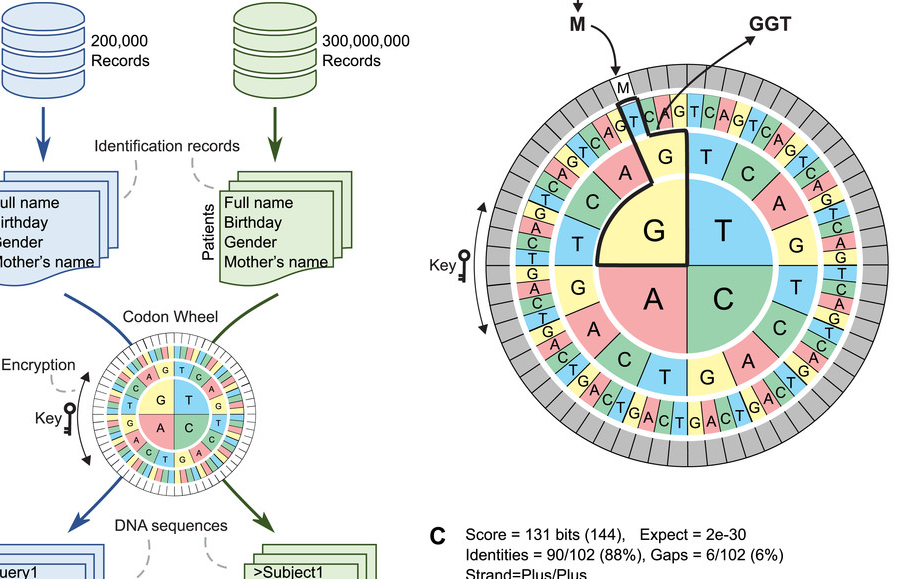Tucuxi-BLAST: Enabling fast and accurate record linkage of large-scale health-related administrative databases through a DNA-encoded approach
Background. Public health research frequently requires the integration of information from different data sources. However, errors in the records and the high computational costs involved make linking large administrative databases using record linkage (RL) methodologies a major challenge. Methods. We present Tucuxi-BLAST, a versatile tool for probabilistic RL that utilizes a DNA-encoded approach to encrypt, analyze and link massive administrative databases. Tucuxi-BLAST encodes the identification records into DNA. BLASTn algorithm is then used to align the sequences between databases. We tested and benchmarked on a simulated database containing records for 300 million individuals and also on four large administrative databases containing real data on Brazilian patients. Results. Our method was able to overcome misspellings and typographical errors in administrative databases. In processing the RL of the largest simulated dataset (200k records), the state-of-the-art method took 5 days and 7 h to perform the RL, while Tucuxi-BLAST only took 23 h. When compared with five existing RL tools applied to a gold-standard dataset from real health-related databases, Tucuxi-BLAST had the highest accuracy and speed. By repurposing genomic tools, Tucuxi-BLAST can improve data-driven medical research and provide a fast and accurate way to link individual information across several administrative databases.
Authors
Araujo, Jose Deney; Santos-e-Silva, Juan Carlo; Costa-Martins, Andre Guilherme; Sampaio, Vanderson; de Castro, Daniel Barros; de Souza, Robson F; Giddaluru, Jeevan; Ramos, Pablo Ivan P; Pita, Robespierre; Barreto, Mauricio L;
External link
Publication Year
Publication Journal
Associeted Project
User-friendly computational Tools
Lista de serviços
-
RASL11A, member of a novel small monomeric GTPase gene family, is down-regulated in prostate tumors.RASL11A, member of a novel small monomeric GTPase gene family, is down-regulated in prostate tumors.
-
Splice variants of TLE family genes and up-regulation of a TLE3 isoform in prostate tumors.Splice variants of TLE family genes and up-regulation of a TLE3 isoform in prostate tumors.
-
Concepts on Microarray Design for Genome and Transcriptome AnalysesConcepts on Microarray Design for Genome and Transcriptome Analyses
-
The iron stimulon of Xylella fastidiosa includes genes for type IV pilus and colicin V-like bacteriocins.The iron stimulon of Xylella fastidiosa includes genes for type IV pilus and colicin V-like bacteriocins.
-
Origins of the Xylella fastidiosa prophage-like regions and their impact in genome differentiation.Origins of the Xylella fastidiosa prophage-like regions and their impact in genome differentiation.
-
The role of prophage in plant-pathogenic bacteria.The role of prophage in plant-pathogenic bacteria.
-
Genetic control of immune response and susceptibility to infectious diseases.Genetic control of immune response and susceptibility to infectious diseases.
-
Building capacity for advances in tuberculosis research; proceedings of the third RePORT international meeting.Building capacity for advances in tuberculosis research; proceedings of the third RePORT international meeting.
-
São Paulo School of Advanced Sciences on Vaccines: an overview.São Paulo School of Advanced Sciences on Vaccines: an overview.
-
A reasonable request for true data sharing.A reasonable request for true data sharing.

